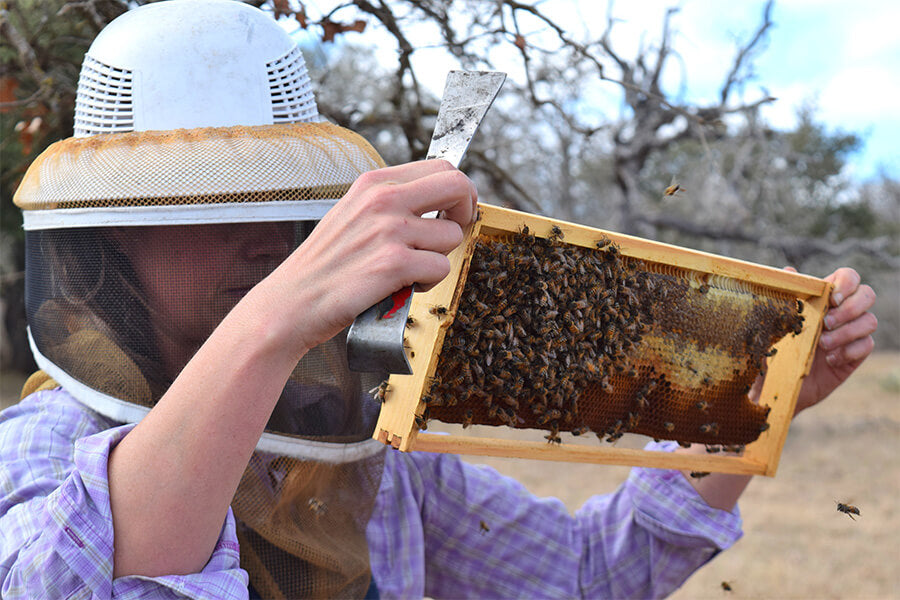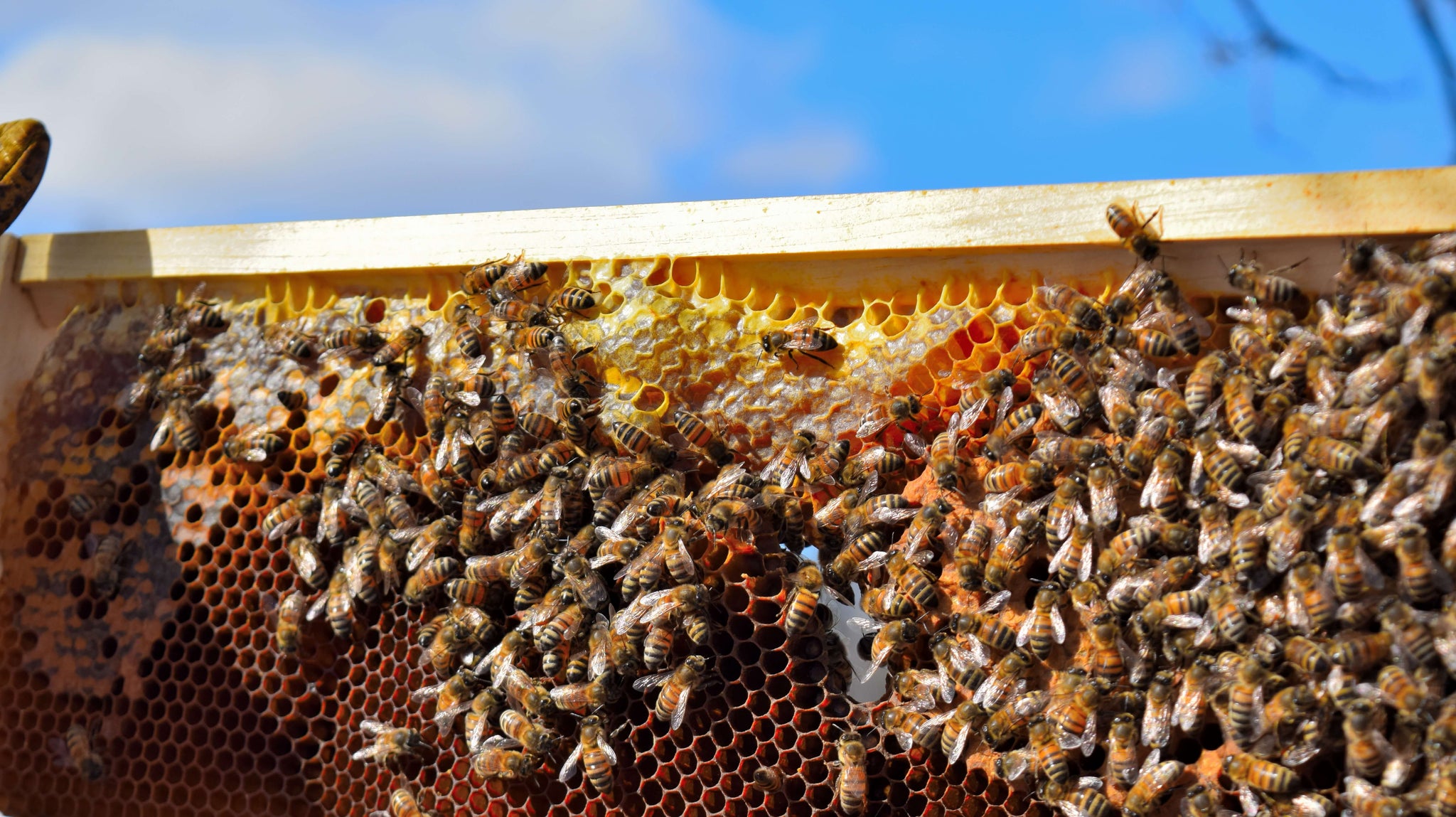One of the best ways to put life in perspective is to stand in a pasture surrounded by animals. It’s cleansing. It’s a grand reminder that our world, our lands, and the vibrant organisms around us are what truly matter. Everything else is trivial. Amazingly, though, all of this—our lives, wealth, and well-being—hinges on the prosperity of one tiny animal: bees.
It’s true. As the chief pollinators of the planet, bees are responsible for fertilizing a jaw-dropping array of flowers and plants. Without them, the majority of flowering plant species—including almost every vegetable we eat—would die off. This includes alfalfa and clover, which are essential food for livestock, especially cattle.

To better understand these powerful and vital creatures (especially honeybees), EPIC has been working with Tara Chapman of Two Hives Honey. She’s been an absolute beast, coaching us up on everything from hive structures to the thousands of different bee species that inhabit our world. Perhaps the most fascinating thing Tara has taught us is how sophisticated and complex these animals are. Everything they do has a purpose.
“Every hive has a personality. Some hives build beautiful, straight comb, while others like to build in crazy shapes and sizes,” she said in a recent interview on The Meatcast. “Some hives will take their dead and essentially toss them out, but I’ve seen times where they’ve been carried away and lined up with their heads all facing the same direction. It’s like a honeybee burial ceremony.”
This is all part of their larger social structure, which harnesses collective power for the greater good. The concept sounds strange at first, but it allows honeybee hives—whose populations can run anywhere from 45,000-75,000—to run seamlessly. To make this happen, everyone has a specialized role. Male bees (drones), for instance, have one job: reproduce. “They have a singular function, so they’re basically disposable,” Tara joked. “They fly around the hive all day looking for a queen to mate with. As crazy as it sounds, their intestines are literally pulled out of their bodies once they’re finished having sex.”
It does sound crazy. But the point of Tara’s example is this: there is no individuality in the hive. Everyone is a cog in a larger machine—and for it to run harmoniously, every bee must do its job. That’s why scientists refer to bees working together as a superorganism: a beautiful, unified unit with a common goal. You won’t find a better example of selflessness and sacrifice anywhere in the world.
Most people assume the queen is the most powerful bee in the hive, but that’s not exactly the case. Don’t get me wrong, they’re important—without them, their species would collapse—but worker bees are the real champions. “Every bee you’ve ever seen out and about has been a worker bee,” Tara explained. “They’re the ones who are responsible for gathering nectar from plants to create honey within the hive. In the process of going plant to plant, they pollinate our world for us. Without them, nobody would eat in their hives.”
We’d have a hard time eating without them, too. Name a food and, chances are, honeybees have played a role in helping it arrive at your dinner table. From cucumbers to apples to cocoa and coffee, they are heavily involved in the fertilization processes that helps plants create seeds for future generations. They’re also integral to the ranching and dairy industries, ensuring that so many of the cover crops ruminant animals eat flourish every year. And yet, North America’s bee populations have plummeted over the past several decades due to large-scale habitat destruction, dangerous pesticides, and commercial agriculture. Suddenly, our once-overlooked food guardians are facing massive population declines and, for many species, extinction.
So much of this stems from Big Ag. As massive fields of row crops like almonds and walnuts have replaced traditional farms, they’ve demanded an increasingly larger presence of imported honeybees to pollinate them. To fill this need, these operations bring in commercial ‘migratory’ hives by the truckload—picture an 18-wheeler full of millions of bees—during the growing season. This has proven to be a largely profitable method, but it’s come with dire consequences: it’s killing off the bees. “Just like humans, dietary diversity is crucial for bees. When they’re forced to pollinate giant fields of the same crop, they’re not getting a balanced diet,” Tara said. “Massive monoculture farms, especially those using utilizing dangerous neonicotinoids, have created a vicious cycle that nobody’s benefitting from.”
As if we needed more proof that monoculture—growing a single commercial crop in mass—is poisoning our soils and stripping our planet of valuable resources. But thanks to the efforts of local beekeepers like Tara, we’re fighting back. In addition to increasing bee awareness, EPIC is heavily investing our time and resources into ensuring they play a huge role in our consumer-led food revolution. In fact, we’ve already installed two of Tara’s hives on ROAM Ranch to lay a strong foundation for vital native plant species and broader land regeneration. By next year, we’ll have roughly 250,000 honeybees helping ROAM flourish. “For a ranch, if you have your cattle on pasture eating alfalfa and clover, you’re going to need bees out there,” Tara said matter-of-factly. “The biggest animals often rely on the smallest ones.”
The right decision isn’t always the easiest one. It costs more to do things in sustainable ways that positively impact our soil and our animals. But at the end of the day, it’s always worth it—both in ecological impact and in product quality. That’s always been our company’s mantra. That’s why we’re working to ensure these striped, six-legged workaholics are more valued, cherished, and recognized than ever before. So whether it’s putting up a hive in your backyard or supporting your local farmers and ranchers who avoid pesticides, go the extra mile. Our world and its bees will thank you.
For more information on honeybees and how you can make your home honeybee-friendly, visit Tara’s website and blog at twohiveshoney.com



